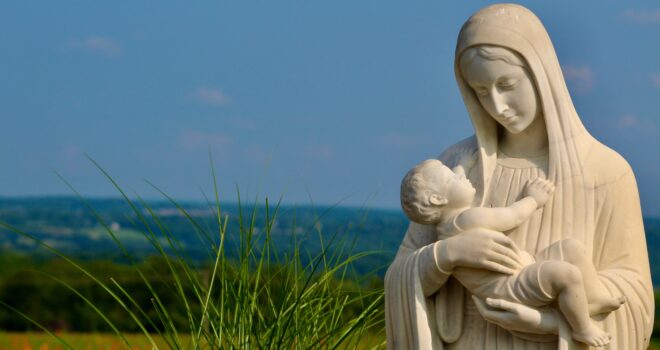Parishes Conclude the Marian Month of May
Thirteenth-century poet Thomas Tusser wrote, “April Showers Bring May Flowers” and that is true for many geographic areas. What is true universally, however, is that for Catholics April introduces May, the month that is dedicated to our Blessed Mother. Hence, the usual reference is to the Marian Month of May, during which time parishioners offer […]



Thirteenth-century poet Thomas Tusser wrote, “April Showers Bring May Flowers” and that is true for many geographic areas. What is true universally, however, is that for Catholics April introduces May, the month that is dedicated to our Blessed Mother. Hence, the usual reference is to the Marian Month of May, during which time parishioners offer prayers and venerations to Mary, often with processions to the May crowning of the statue of Mary with flowers.
In their own homes, parishioners can pray a novena to the Immaculate Heart of Mary, place flowers on their own statue of Mary, and pray the rosary regularly plus more. Catholics may also wish to go on a Marian pilgrimage, such as occurred this year when more than 5,000 people started in De Pere, Wisconsin at the National Shrine of St. Joseph and ended up at the National Shrine of Our Lady of Champion.
Daily or weekly devotional structure may vary according to a parish’s location—so long as parishioners sing Marian anthems, the pastor or a parishioner crowns the statue of Mary with flowers, and that scriptural readings occur. Activities might also depend on the size of the parish.
For example, Father Bill John Melançon, pastor of St. Rita Church (about 850 parishioners) in Catahoula and at nearby St. Elizabeth Parish (250 parishioners) in Coteau Holmes, Louisiana, noted, “We have our regular Our Lady of Perpetual Help Novena once a week; at St. Rita’s it’s on Tuesday afternoon and at Saint Elizabeth it is Wednesday morning. Depending on the Mass time, we recite the Angelus immediately before or after weekday Masses….We recite the rosary before Mass,” he said. “There is no history of additional Marian traditions in either of my parishes in May. …Many nearby parishes have May Crownings.”
At the larger St. Veronica Catholic Church (more than 3,000 parishioners) in Chantilly, Virginia, Father Dennis Kleinmann noted that on Sunday, May 14, first communicants would attend the morning Mass. “Before Mass, the girls will come in with a May crowning, and all the other with their mothers, and walk down to the main aisle to give a flower to the statue and fill vases. Mary will be crowned by one of the girls and these flowers will be around the statue,” he said. “On Monday, the 15th, the CCD students will have a ceremony too, and she will be crowned outside, there will be a litany to the Blessed Mother, and one of the youngsters will crown her at the outside statue. And on the 19th, the second graders along with the other students at the school will say the rosary, crown the Blessed Mother statue, and there will be litany with prayers and music. There will be a procession inside or outside if it is not raining.” For the Sunday and Monday ceremonies, food was served to mothers and their children.
At St. Theresa Catholic Church (about 14,000 parishioners) in Ashburn, Virginia, Father James Hudgins noted that parishioners have daily Marian devotions and say the rosary daily after Mass. “The only thing we do for the month of May,” he said, “is a May crowning from the students at our school, from religious education participants, and from the parish. We don’t mind crowning Mary several times. For the grade school, there is a procession to the crowning from past years, and all have a rose. The first communicants dress up in first communion clothing, carry a rose, and place the rose in a vase in front of the states, then crown the statues, and say the rosary.”
St. Theresa’s hosts two May crowning ceremonies: the first with the first Holy Communicants on the first Sunday in May, and Friday of that week, with the second graders after Mass carrying flowers up to the statues of Mary and singing Marian songs and putting the crown on her head. The parish also has a portable statue of Mary that visits different classrooms throughout the year, starting in April and staying in that classroom for one week.
Photo by Jonathan Dick, OSFS on Unsplash














